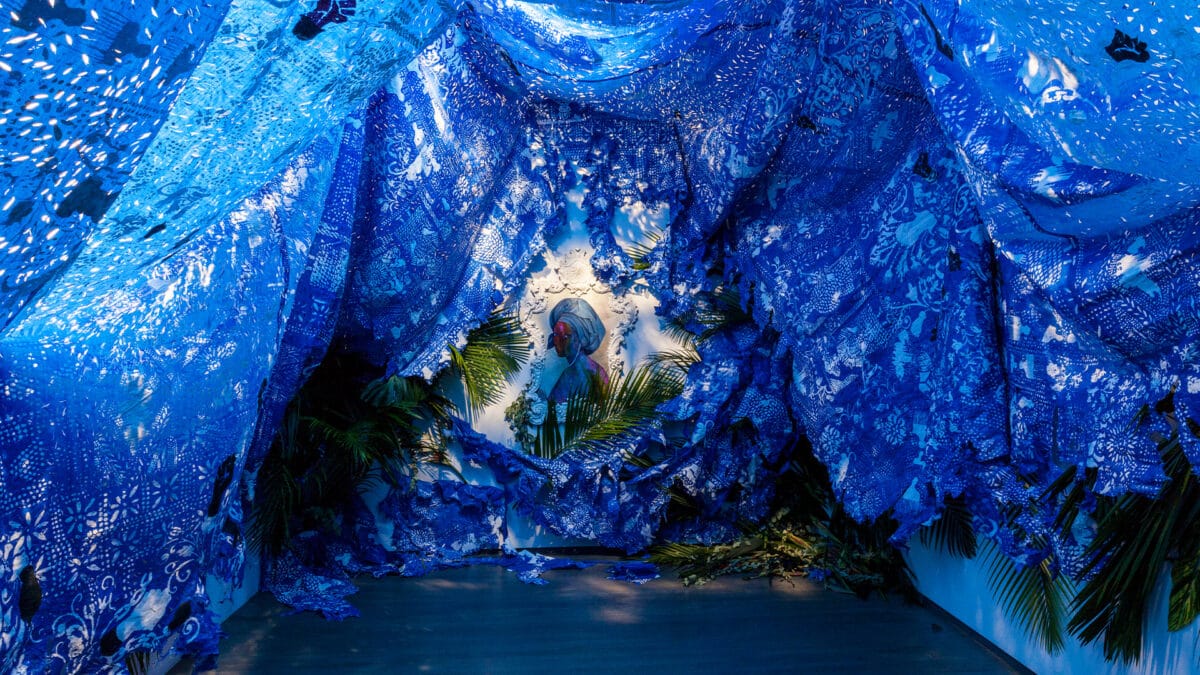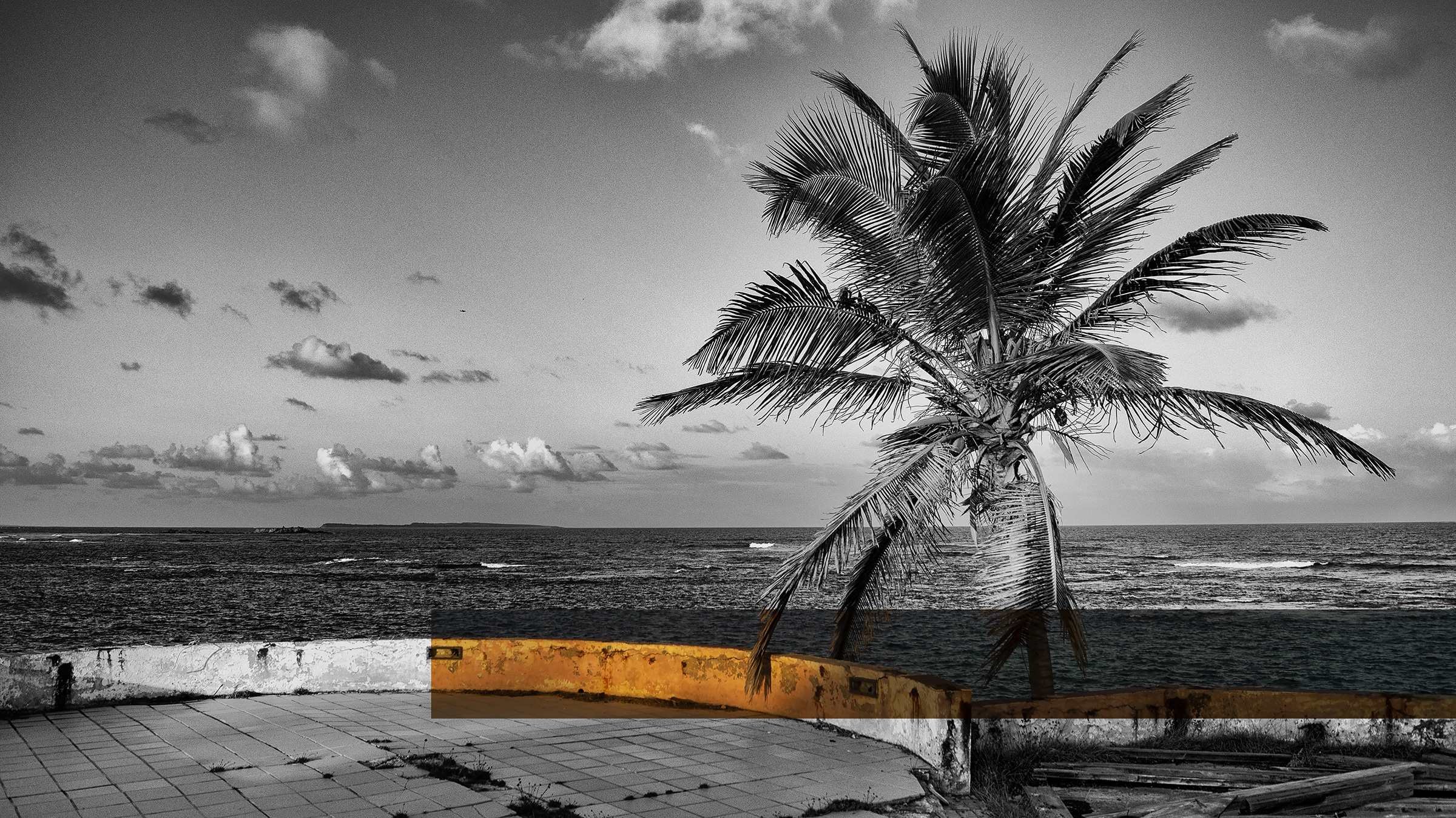
For Immediate Release
Contact: Amy Day
Tel: 515.271.0344 (o)
515.612.0775 (c)
aday@desmoinesartcenter.org
DES MOINES, IOWA (May 2024) – The Des Moines Art Center is preparing for waves of excitement with the opening of a new, thought-provoking exhibition, “Hurricane Season: Caribbean Art + Climate Change,” on view June 8 to September 22, 2024.
Every year from June through November, islanders across the Caribbean archipelago hold their breath for hurricane season. Hurricanes and the devastation they bring have long been a part of life in the Caribbean, but with climate change, these storms are becoming more violent and more threatening, leaving little time to prepare. The aftermath sheds light not only on the destruction, but on the living legacy of colonialism and ongoing political corruption. Yet even as the effects of climate change wreak havoc on the region, life across the archipelago continues. People adapt to the environment, weathering the storm even as they are weathered by it.
“Hurricane Season” features 58 works in a range of media by six artists from across the Caribbean archipelago and its diaspora: Firelei Báez, Lionel Cruet, Teresita Fernández, Tamika Galanis, Deborah Jack, and Hew Locke. Through their work, these artists succeed in demonstrating the crucial role arts can play in this unfolding crisis by translating data sets and dire predictions into relatable terms, reframing the conversation around notions of community, family, and home.
The Des Moines Art Center is proud to have been approved for a $25,000 Grants for Arts Projects award from the National Endowment for the Arts (NEA) which will be used to support the exhibition. The Art Center’s “Hurricane Season: Caribbean Art + Climate Change” is among 1,135 projects from across the country, totaling more than $37 million, to be selected during this second round of Grants for Arts Projects for fiscal year 2024.
“Projects like ‘Hurricane Season’ exemplify the creativity and care with which communities are telling their stories, creating connection, and responding to challenges and opportunities in their communities—all through the arts,” said NEA Chair Maria Rosario Jackson, PhD. “So many aspects of our communities such as cultural vitality, health and wellbeing, infrastructure, and the economy are advanced and improved through investments in art and design, and the NEA is committed to ensuring people across the country benefit.”

“As a museum dedicated to the display of contemporary art,” John and Mary Pappajohn Director Kelly Baum adds, “the Des Moines Art Center is equally committed to investigating issues that matter most to people—both artists and viewers—in the early 21st century. Among the many topics felt and debated today, few are as urgent as climate change and environmental justice. I thank Dr. Mia Laufer for bringing this timely exhibition to fruition and I thank the artists for prompting us to think more incisively about the world in which we live. I am also grateful to the NEA and other funders for making our important work possible.”
Additional support for the exhibition is provided by the Harriet S. and J. Locke Macomber Art Center Fund, Ask Studio, and Art Center patrons and members.
“Hurricane Season” is curated by Mia Laufer, Ph.D. and accompanied by a fully illustrated catalogue with essays by Laufer and Dr. Lisa Paravisini-Gebert (Vassar), and poetry by Edwidge Danticat, Olive Senior, and Celia A. Sorhaindo. The catalogue is available in the Art Center’s Museum Shop.
“Hurricane Season: Caribbean Art + Climate Change” includes numerous related programs designed to introduce the community to the artists and the themes of the exhibition. Visit desmoinesartcenter.org for more information.
Fingerman Lecture 2024 featuring Teresita Fernández
Thursday, June 6 | 6 pm
Free; reservations required.
Opening Celebration
Friday, June 7 | 5 – 7 pm
Free; no reservations required.
“Guabancex” Dance Performance by N’Jelle Gage Thorne
Friday, July 12 | 1:30 pm and 5:30 pm
Free; reservations required.
Gallery Talk with Artist Lionel Cruet and Curator Mia Laufer
Thursday, August 8 | 5:30 pm
Free; no reservations required.
“Landfall” Film and Post-film Dialogue with Professor Alfredo Rivera
Sunday, September 8 | 1:30 pm
Landfall, 2020 (90 minutes) Directed by Cecilia Aldarondo
Free; no reservations required.
For more information, or images from the exhibition, contact Senior Director of Communications and Marketing Amy Day at aday@desmoinesartcenter.org.
Cover Image: Firelei Báez (Dominican, born 1981), roots when they are young and most tender, 2018 (detail), Mixed-media installation; two paintings, hand painted papier-mâché sculptures, hand painted tarp, chicken wire and foliage, Dimensions variable, Rennie Collection, Vancouver, © Firelei Báez; Image courtesy of the Artist, Kavi Gupta, Chicago and Rennie Collection, Vancouver; Photography by John Lusis
About the Des Moines Art Center
The Des Moines Art Center is a vibrant, AAM-accredited (American Association of Museums) institution located in the capital city of Iowa that welcomes over 300,000 visitors annually from across the country and around the globe. Its historic campus consists of three buildings designed by major architects of the 20th century—Eliel Saarinen, I. M. Pei, and Richard Meier—incorporated into the natural landscape of Greenwood Park. The Art Center is home to one of the strongest collections of 20th- and 21st-century art in the region, and it hosts a series of ground-breaking exhibitions and lectures each year featuring artists known regionally, nationally, and internationally. The experimental art for which the Art Center cares is reflected in its creative offerings, including a celebrated education program that prioritizes access and collaboration, an art school with studio classes for all ages, and the John and Mary Pappajohn Sculpture Park, situated on 4.4 acres in downtown Des Moines. The Art Center is committed to the values of diversity, equity, and inclusion, which are incorporated into every facet of its mission and identity.
###